Monitor "injector" parameter on scantool.


Electronically controlled fuel injector is a solenoid valve which supplies exactly calculated amount of fuel to engine for optimum conbustion under various engine load and speed. To meet air-fuel ratio required in system, ECM regulates fuel injection quantity as controlling injector solenoid operating duration referring air flow to cylinders and output signals from HO2S. For this precise control, quick response of solenoid is required and for perfect combustion, injection characteristic is important.
If there is Short to ground in injector #4 circuit, PCM sets DTC P0270.
Item | Detecting Condition | Possible Cause |
DTC Strategy | ● Circuit continuity check, low | ● Poor connection ● Short to ground in control circuit ● Injector |
Enable Conditions | ||
Threshold Value | ||
Diagnostic Time | ● Continuous | |
MIL ON Condition | ● 2 driving cycle |
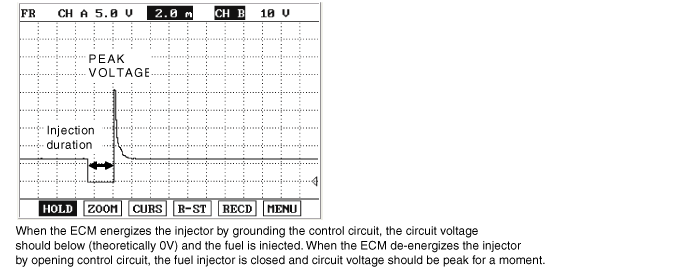
Temperature (℃[℉]) | Resistance (Ω) |
20 (68) | 13.8 ~ 15.2 Ω |
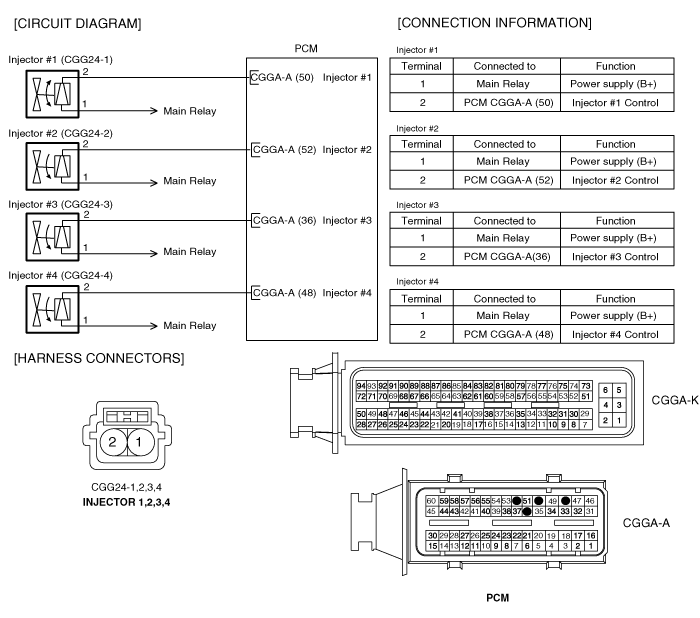
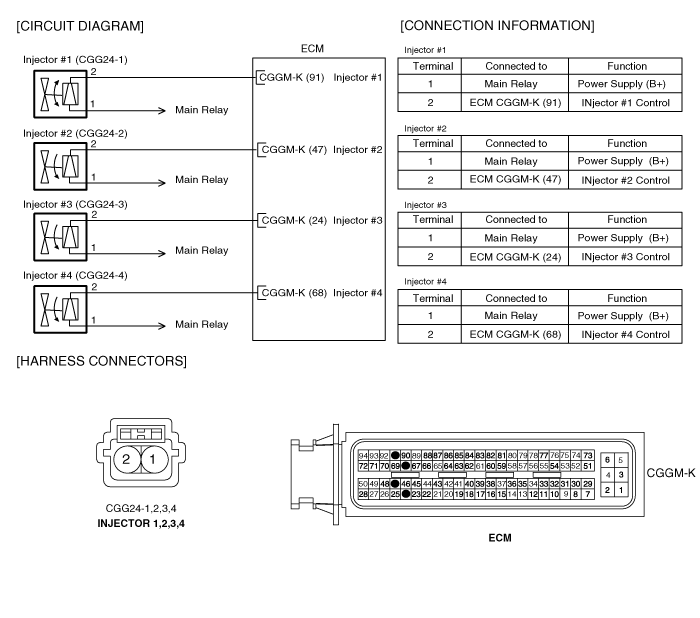
Connect scantool to DLC (Data Link Cable).
Warm up the engine to normal operating temperature.
Monitor "injector" parameter on scantool.

Is the "Injector" parameter displayed correctly?

▶ Fault is intermittent caused by poor contact in the sensor’s and/or ECM’s connector or was repaired and ECM memory was not cleared. Thoroughly check connectors for looseness, poorconnection, ending, corrosion, contamination, deterioration, or damage. Repair or replace asnecessary and go to "Verification of Vehicle Repair" procedure.

▶ Go to "Terminal and Connector Inspection" procedure.
Many malfunctions in the electrical system are caused by poor harness and terminals. Faults can also be caused by interference from other electrical systems, and mechanical or chemical damage.
Thoroughly check connectors for looseness, poor connection, bending, corrosion, contamination, deterioration, or damage.
Has a problem been found?

▶ Repair as necessary and go to "Verification of vehicle Repair" procedure.

▶ Go to " Control Circuit Inspection " procedure.
IG "OFF".
Disconnect injector connector.
IG "ON" & ENG "OFF".
Measure voltage between terminal 2 of injector harness connector and chassis ground.
Specification : Approx. 3.5V
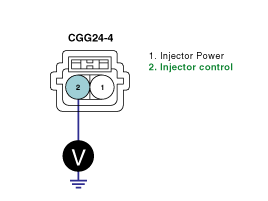
Is the measured voltage within specification?

▶ Go to "Component Inspection" procedure.

▶ Repair or replace as necessary and then, go to "Verification of Vehicle Repair" procedure.
Check injecotor resistance.
IG "OFF".
Disconnect injector connector.
Measure resistance between terminal 1 and 2 of injector connector.(Component Side)
Temperature (℃[℉]) | Resistance (Ω) |
20 (68) | 13.8 ~ 15.2 Ω |
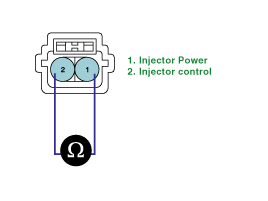
Is the measured resistance within specification?

▶ Many malfunctions in the electrical system are caused by poor harness(es) and terminals. Faults can also be caused by interference from other electrical systems, and mechanical or chemical damage. So, check poor connections and the related circuit between ECM and component thoroughly. Repair as necessary and go to "Verification of Vehicle Repair" procedure.

▶ Substitute with a known - good injector and check for proper operation.
▶ If the problem is corrected, replace injector and go to "Verification of Vehicle Repair" procedure.
After a repair, it is essential to verify that the fault has been corrected.
Connect scan tool and select "Diagnostic Trouble Codes(DTCs)" mode.
Press F4(DTAL) and confirm that "DTC Readiness Flag" indicates "Complete".
If not, drive the vehicle within conditions noted in the freeze frame data or enable conditions.
Read "DTC Status" parameter.
Is parameter displayed "History(Not Present) fault"?

▶ System performing to specification at this time. Clear the DTC.

▶ Go to the applicable troubleshooting procedure.